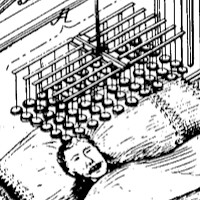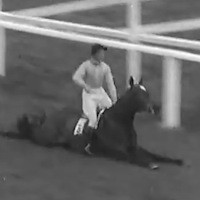The Great Train Robbery

Movies like Ocean’s 11 glorify crimes of bank robbery. In the case of Billy Ocean, the theft of money from the five largest casinos in Las Vegas was completely justified. The owner was, after all, a jerk. A really good looking jerk, but a jerk all the same. And, he’d stolen Tess, Billy’s wife—ex-wife. Turn about’s fair play, right?
The movie tells of an elaborate plan to knock off five casinos and split the money. The original version of this movie came out in 1960. The only significance of the date is that three years later, fifteen friends plotted and executed one of the largest robberies in the history of Great Britain. The Great Train Robbery of 1963 has been listed in Time’s list of Top 25 Crimes of the 1900’s.
The heist itself, however, wasn’t exactly as grand as Billy Ocean’s plan. In fact, the fifteen member motley crew of robbers would have done better had the fictitious Ocean been running the heist. They used no guns, but they did assault the train’s driver with an iron pipe. They also left fingerprints. Not just one or two here and there. They left clear fingerprints everywhere.
April 16, 1964 saw the trial and sentencing of thirteen of the fifteen bandits. Within 15 months of going to prison, Ronnie Biggs escaped to Paris. Here, he underwent plastic surgery and “acquired new identity papers.”1 After living in Paris, he moved, quietly, to Adelaide, Australia. He took up employment as a builder and lived a normal life—until he was tipped off about the police being on to him. Then he moved to Melbourne, then eventually to Rio de Janeiro, Brazil. Since the UK and Brazil did not share extradition reciprocity, Biggs lived openly in Brazil, untouchable by the police.
Only four months after the trials and sentencing, another of the band escaped from prison—Charlie Wilson. He fled to Canada to an upper-middle class area. The houses were on individual plots and surrounded by trees. He was fine until he invited his brother-in-law for Christmas. Scotland Yard was able, then to track him down. They waited on apprehending him a second time in the hopes that he would lead them to the other yet unaccounted for bandit. Much to their disappointment, he did not. They arrested him and extradited him back to England. The neighbors of he and his wife and children petitioned to allow his family to remain in Canada.
But, what about Ronnie Biggs? He became a sort of folk hero in England even though his part in the actual heist was small. He lived in Brazil until 2001, when at the age of 71 (and after suffering three strokes), he decided to return to England. Medical costs in Brazil were taking their toll. In an interview with The Sun, Biggs said, "My last wish is to walk into a Margate pub as an Englishman and buy a pint of bitter."2 Biggs was arrested and remanded to prison to finish his 28 years.
For more information, or to view the sources for this article, please see the following links:
Time's Top 25 Crimes of the Century
Wikipedia
The Sun
The movie tells of an elaborate plan to knock off five casinos and split the money. The original version of this movie came out in 1960. The only significance of the date is that three years later, fifteen friends plotted and executed one of the largest robberies in the history of Great Britain. The Great Train Robbery of 1963 has been listed in Time’s list of Top 25 Crimes of the 1900’s.
The heist itself, however, wasn’t exactly as grand as Billy Ocean’s plan. In fact, the fifteen member motley crew of robbers would have done better had the fictitious Ocean been running the heist. They used no guns, but they did assault the train’s driver with an iron pipe. They also left fingerprints. Not just one or two here and there. They left clear fingerprints everywhere.
April 16, 1964 saw the trial and sentencing of thirteen of the fifteen bandits. Within 15 months of going to prison, Ronnie Biggs escaped to Paris. Here, he underwent plastic surgery and “acquired new identity papers.”1 After living in Paris, he moved, quietly, to Adelaide, Australia. He took up employment as a builder and lived a normal life—until he was tipped off about the police being on to him. Then he moved to Melbourne, then eventually to Rio de Janeiro, Brazil. Since the UK and Brazil did not share extradition reciprocity, Biggs lived openly in Brazil, untouchable by the police.
Only four months after the trials and sentencing, another of the band escaped from prison—Charlie Wilson. He fled to Canada to an upper-middle class area. The houses were on individual plots and surrounded by trees. He was fine until he invited his brother-in-law for Christmas. Scotland Yard was able, then to track him down. They waited on apprehending him a second time in the hopes that he would lead them to the other yet unaccounted for bandit. Much to their disappointment, he did not. They arrested him and extradited him back to England. The neighbors of he and his wife and children petitioned to allow his family to remain in Canada.
But, what about Ronnie Biggs? He became a sort of folk hero in England even though his part in the actual heist was small. He lived in Brazil until 2001, when at the age of 71 (and after suffering three strokes), he decided to return to England. Medical costs in Brazil were taking their toll. In an interview with The Sun, Biggs said, "My last wish is to walk into a Margate pub as an Englishman and buy a pint of bitter."2 Biggs was arrested and remanded to prison to finish his 28 years.
For more information, or to view the sources for this article, please see the following links:
Time's Top 25 Crimes of the Century
Wikipedia
The Sun
You Should Also Read:
Bloody Valentine's (February 14, 1929)
The Battle of Alcatraz (May 2-4, 1946)
The Crime Site

Related Articles
Editor's Picks Articles
Top Ten Articles
Previous Features
Site Map
Content copyright © 2023 by Christa Mackey. All rights reserved.
This content was written by Christa Mackey. If you wish to use this content in any manner, you need written permission. Contact Lane Graciano for details.







